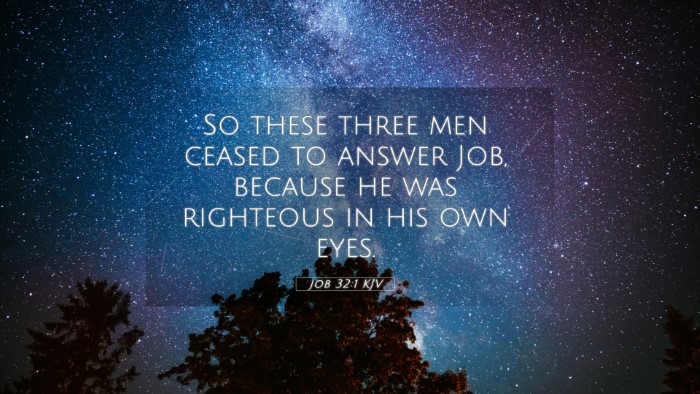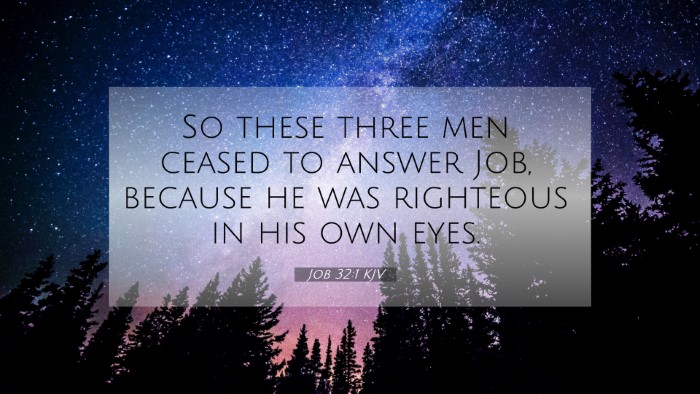Old Testament
Genesis Exodus Leviticus Numbers Deuteronomy Joshua Judges Ruth 1 Samuel 2 Samuel 1 Kings 2 Kings 1 Chronicles 2 Chronicles Ezra Nehemiah Esther Job Psalms Proverbs Ecclesiastes Song of Solomon Isaiah Jeremiah Lamentations Ezekiel Daniel Hosea Joel Amos Obadiah Jonah Micah Nahum Habakkuk Zephaniah Haggai Zechariah MalachiJob 32:1 Similar Verses
Job 32:1 Cross References
So these three men ceased to answer Job, because he was righteous in his own eyes.
Uncover the Rich Themes and Topics of This Bible Verse
Listed below are the Bible themes associated with Job 32:1. We invite you to explore each theme to gain deeper insights into the Scriptures.
Job 32:1 Cross Reference Verses
This section features a detailed cross-reference designed to enrich your understanding of the Scriptures. Below, you will find carefully selected verses that echo the themes and teachings related to Job 32:1 KJV. Click on any image to explore detailed analyses of related Bible verses and uncover deeper theological insights.

Job 10:7 (KJV) »
Thou knowest that I am not wicked; and there is none that can deliver out of thine hand.

Job 23:7 (KJV) »
There the righteous might dispute with him; so should I be delivered for ever from my judge.

Job 13:15 (KJV) »
Though he slay me, yet will I trust in him: but I will maintain mine own ways before him.

Job 29:11 (KJV) »
When the ear heard me, then it blessed me; and when the eye saw me, it gave witness to me:

Job 6:29 (KJV) »
Return, I pray you, let it not be iniquity; yea, return again, my righteousness is in it.
Job 32:1 Verse Analysis and Similar Verses
Understanding Job 32:1
Job 32:1: "So these three men ceased to answer Job, because he was righteous in his own eyes."
This verse captures a pivotal moment in the Book of Job, reflecting on the dynamics of dialogue between Job and his friends. Understanding this passage involves delving into the implications of righteousness, the nature of argumentation, and the role of divine truth in human discourse.
Summary of Meaning
Job 32:1 illustrates the conclusion of the debates between Job and his friends. After enduring a series of accusations regarding his character and suffering, Job defends himself, claiming his righteousness. The friends, unable to counter his assertions effectively, fall silent. This verse introduces a new character, Elihu, who will bring a fresh perspective to the discussion.
Insights from Public Domain Commentaries
-
Matthew Henry: Henry emphasizes that the silence of Job's friends illustrates their inability to challenge Job's integrity. They previously spoke out of ignorance and arrogance, and recognizing Job's uprightness leads them to retreat from the debate.
-
Albert Barnes: Barnes highlights that Job’s assertion of his righteousness signifies his struggle against the conventional understanding of suffering as punishment for sin. This verse illustrates a critical moment where traditional wisdom fails.
-
Adam Clarke: Clarke discusses the implications of the men ceasing their arguments – it marks a turning point in Job’s narrative where divine insight introduces new voices in the discourse. Clarke suggests that it's a narrative device to prepare readers for Elihu's message.
Cross-References Related to Job 32:1
- Job 4:7 - "Consider now: Who, being innocent, has ever perished?"
- Job 9:20 - "Even if I were innocent, my mouth would condemn me; if I were blameless, it would prove me perverse."
- Job 13:23-24 - "How many wrongs and sins have I committed? Show me my offense and my sin. Why do you hide your face and consider me your enemy?"
- Job 19:4 - "Even if I have wronged my neighbor or repaid my friend with evil..."
- Proverbs 18:2 - "A fool finds no pleasure in understanding but delights in airing his own opinions."
- Ecclesiastes 7:20 - "Indeed, there is no one on earth who is righteous, no one who does what is right and never sins."
- Matthew 5:20 - "For I tell you that unless your righteousness surpasses that of the Pharisees and the teachers of the law, you will certainly not enter the kingdom of heaven."
Thematic Connections
This verse invites a broader examination of the themes of suffering, righteousness, and divine justice. By noting the silence of Job’s friends, readers can reflect on the limitations of human understanding in the face of divine providence and the complexities of moral righteousness. The silence of the three friends also contrasts with the forthcoming voice of Elihu, introducing new avenues of thought regarding suffering and God’s justice.
Cross-referencing Biblical Texts
Cross-referencing in Biblical studies offers deeper insights into the text. Scholars and students of the Bible can employ these tools effectively:
- Bible concordance - To locate specific themes across scriptures.
- Bible cross-reference guide - Identifying related verses for thematic study.
- Cross-reference Bible study methods - Engaging with verses in a comparative manner.
- Bible reference resources - Utilizing tools developed for deeper scripture analysis.
- Identifying connections between Old and New Testament - To build a chronological framework around themes of righteousness and suffering.
Practical Application
The application of Job 32:1 in daily life can lead to profound personal reflections on our perception of righteousness and the nature of our dialogues with others. When faced with contention, understanding the limitations of our perspectives can foster humility and openness.
User Intent and Connection Keywords
For those seeking to understand the connections and themes surrounding Job 32:1, the following inquiries may be useful:
- What verses are related to Job 32:1?
- How do Job 4:7 and Job 32:1 connect in terms of suffering and righteousness?
- Bible verses that support Job's assertion of his righteousness.
- How to find cross-references for Job 32:1?
Conclusion
Job 32:1 serves as a critical nexus in the dialogue of the book, illustrating the tension between human understanding and divine truth. Through cross-referencing, readers can deepen their comprehension of righteousness, suffering, and the complex nature of moral discourse. By exploring related verses and themes, one can grasp the intricate relationship between Job’s assertions and the overarching narrative of the Bible.






